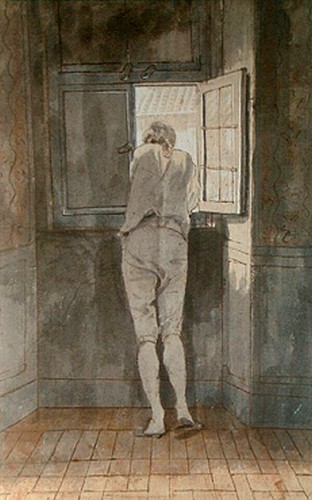
Imagine there was the Art Song Awards, a kind of Academy Awards (I wonder... how would it be known? The Schuberts? Would the statuette be a linden branch?). Anyway, if the awards existed, Johann Wolfgang Goethe would clearly be nominated to two categories: "The most musicalized poet" and "The most adapted poem ever". So far, I've published about ninety posts on the blog's Catalan version; twelve of the songs have already been Goethe's poems, the only poet that could put him in the shade would be Rückert, but just because I have weakness for him (to be honest, though, they are far from being comparable...)
Some of the most musicalized Goethe's poems are from his novel Wilhelm Meisters Lehrjahre (Wilhelm Meister's Apprenticeship); I've long been trying to avoid writing about them because I was considering to write a series. On one hand, it seemed to me an interesting idea, because those songs are as well known as the novel is unknown, if you know what I mean...; on the other hand, I worried I would be overwhelmed by the task. All in all, I've decided to start a series, beginning with this post, which will take at least 15 more: two introductory posts plus one (or two) more related to every poem. All together will last... I don't know, probably a really long time. The good thing about getting into this mess is that we'll be finally listening to all those songs I've been "concealing".
The story began in 1795, when Goethe published Wilhelm Meisters Lehrjahre. The novel is about the life of the main character, Wilhelm Meister, from his early age to his maturity. Long reflections on the theatre (young Wilhelm's great passion) and life alternate with a plot full of characters whose relationships, with all due respect to Goethe, would be considered unbelievable even in today's soap operas. Anyway, some of these characters sing every now and then, and that's the thing! These songs become "Wilhelm Meister's songs", the poems that inspired many composers from Reichardt and Zelter, who wrote their songs just a few months after the novel was published, to Berg, at the beginning of the 20th century.
There are fourteen songs in the novel, but not all of them are equally significant to Art Song's history. The most important are those of harpist's and Mignon's who sing nine of them; the five remaining are sung by different performers each (among them a choir of children). I've already mentioned Reichardt, Zelter and Berg; the most important cycles are those of Schubert, Schumann and Wolf, although there are also isolated songs by Beethoven, Tchaikovsky and Duparc among others. Special mention, though, to Anton Rubinstein who was, as far as I know, the only composer who wrote the fourteen songs.
Talking about cycles, there are some which have an internal plot, meaning that they are self-explanatory (e.g., Dichterliebe); others don’t have any because the songs are linked, for instance, by the poems’ author (e.g., the Rückert Lieder). However, "Wilhelm Meister's songs” can be defined as an "external plot cycle" as the plot cannot be followed just from the poems because some extra information from the novel is required. I’d like to convey, thus, the huge importance of this plot and why I intend to explain it to you along the series.
In order to start with the first song, we need to know some things about Wilhelm's life first which I tell you about in my next post. In the meantime let's just listen to Romance de Mignon, Duparc's version of one of the most popular songs, Kennst du das Land (Do you know the land). The French text is by Victor Wilder and the performers are Véronique Gens and Susan Manoff.
Before ending this post, just one more thing about the title. "Remember to live" (Gedenke zu leben) is a message that arrives to Wilhelm, let's say, by the hereafter; a kind of "memento mori" (remember that you are going to die) but the other way around. Perhaps I should have left it for the end of the series because this sentence appears in the novel's very last pages, but as I have no idea when that is going to happen...
Le connais-tu ce radieux pays
Où brille dans les branches l’or des fruits?
Un doux zéphyr embaume l’air
Et le laurier s’unit au myrte vert.
Le connais-tu? Le connais-tu?
Là-bas, là-bas mon bien-aimé
Courons porter nos pas.
Le connais-tu ce merveilleux séjour
Où tout me parle encore de notre amour?
Où chaque objet me dit avec douleur
Qui t’a ravi ta joie et ton bonheur?
Le connais-tu? Le connais-tu?
Là-bas, là-bas, mon bien-aimé
Courons porter nos pas.
Do you know that radiant land
Where golden fruit shines among the branches?
A gentle breeze scents the air
And the laurel grows by the green myrtle.
Do you know it? Do you know it?
Yonder, yonder, my beloved.
Hasten, thither let us go.
Do you know that marvellous dwelling
Where all still speaks to me of our love?
Where each thing asks with sadness
Who has robbed you of your joy and happiness?
Do you know it? Do you know it?
Yonder, yonder, my beloved
Hasten, thither let us go.
(translation by Hyperion)













Comments powered by CComment